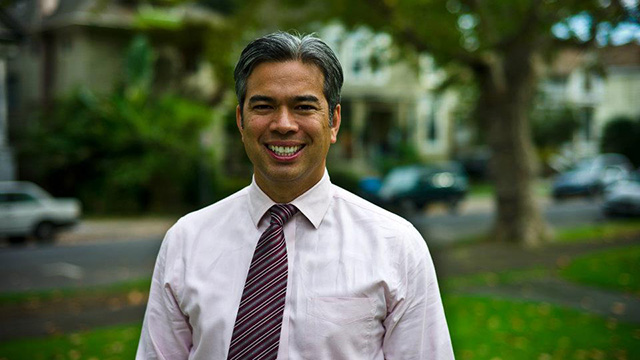SUMMARY
This is AI generated summarization, which may have errors. For context, always refer to the full article.

MANILA, Philippines – Despite being home to the largest Filipino American population in the US, California never had a Filipino American legislator. Until now.
Quezon City-born Rob Bonta, 41, was elected into Assembly – as the representative for California’s 18th Assembly District – in 2012.
He beat Peralta Community College District Trustee Abel Guillen for the18th District’s seat. The recently re-drawn district includes Alameda, San Leandro, and most of Oakland.
Breaking barriers
While Rob Bonta may be the first Fil-Am elected to the assembly, he is not the only Fil-Am newsmaker in California’s political scene.
Mona Pasquil became the highest ranking Asian-American in California when she was appointed interim Lieutenant Governor of California in November of 2009.
40 other Fil-Ams – the highest number of Fil-Ams in United States history – also vied for various seats across the country in 2012, although only 26 won.
READ: 26 Fil-Ams winning in US polls
Political newcomer, optometrist Dr Jennifer Ong of Hayward California – who was also born in Quezon City – ran in the 20th District, but lost the election to Hayward City Council Member Bill Quirk by a very narrow margin. If Ong won, she would have been the first Filipino woman elected to California’s lower house.
“As a small child, I never would have imagined that I would become the first California State Assemblymember of Filipino American descent,” Bonta told Rappler.
Beginnings
Bonta’s parents were organizers with the United Farm Workers (UFW) and worked with co-founders Cesar Chavez, Dolores Huerta and Filipino UFW leaders Philip Vera Cruz, Larry Itliong, and Pete Velaso in La Paz, the UFW headquarters in California’s Central Valley, where he spent his childhood years.
The 1965 strikes made Chavez a household name, but most Americans are only beginning to learn about the Filipino connection in the story of the farm labor movement.
His mother Cynthia was born in Silliman, Dumaguete, and attended the University of the Philippines in Diliman. Bonta came to the US when he was only two years old.
Prior to being elected to the State Assembly, Bonta was the vice mayor of Alameda, California. He was also a member of the Alameda Health Care District Board of Directors, where his main role was to help stabilize the budget of Alameda’s public hospital.
He was chair of Alameda’s Economic Development Commission and the board president for the Social Service Human Relations board, which oversees “the most vulnerable members of the community.”
Bonta has 3 children and has previously worked as deputy city attorney for the city and county of San Francisco before he was elected.
He earned a BA in History and his Juris Doctor from Yale and also took up graduate studies in politics, philosophy and economics at Oxford University.
History
“Positively no Filipinos allowed.”
These words hang in Bonta’s office. “It is a reminder of how our community was treated when we arrived in this country. It is also a reminder of what we are capable of accomplishing,” Bonta told Rappler.
The sign was hung in many public locations in California during the first wave of Filipino migrants. Less than a century ago, whites would call Fil-Ams derogatory names like “little brown monkeys,” and would use violence against Filipinos.
Many whites feared Filipinos were stealing their jobs – because they were willing to work for lower pay – and their women.
In 2009, the 111th US Congress passed a resolution officially recognizing October as Filipino American History Month. The resolution seeks to recognize the achievements and contributions of Fil-Ams.
Filing California Assembly Bill 123, Bonta says, was his way of taking history month a step further. It would require every public school in California to include Filipino-American history in primary and secondary schools.
Bonta announced on September 10 that the bill passed the State Senate with “overwhelming bipartisan support” and is headed to Governor Jerry Brown’s desk for review. – Rappler.com
Add a comment
How does this make you feel?
There are no comments yet. Add your comment to start the conversation.